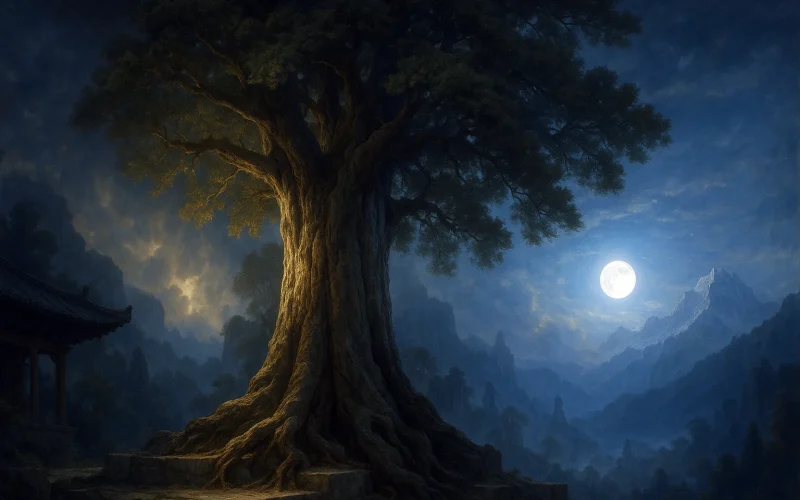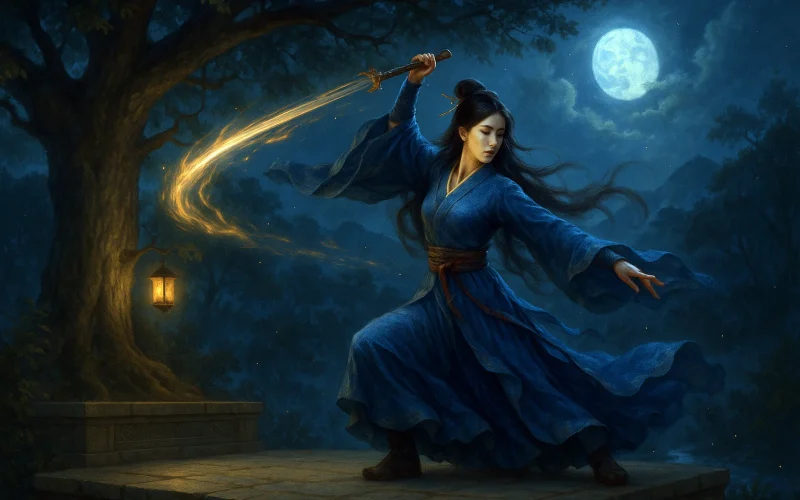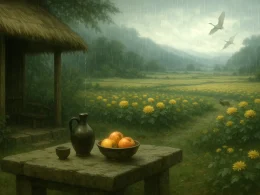Beside the Temple of the Great Premier stands an ancient cypress
With a trunk of green bronze and a root of stone.
The girth of its white bark would be the reach of forty men
And its tip of kingfish-blue is two thousand feet in heaven.
Dating from the days of a great ruler's great statesman,
Their very tree is loved now and honoured by the people.
Clouds come to it from far away, from the Wu cliffs,
And the cold moon glistens on its peak of snow.
...East of the Silk Pavilion yesterday I found
The ancient ruler and wise statesman both worshipped in one temple,
Whose tree, with curious branches, ages the whole landscape
In spite of the fresh colours of the windows and the doors.
And so firm is the deep root, so established underground,
That its lone lofty boughs can dare the weight of winds,
Its only protection the Heavenly Power,
Its only endurance the art of its Creator.
Though oxen sway ten thousand heads, they cannot move a mountain.
...When beams are required to restore a great house,
Though a tree writes no memorial, yet people understand
That not unless they fell it can use be made of it....
Its bitter heart may be tenanted now by black and white ants,
But its odorous leaves were once the nest of phoenixes and pheasants.
...Let wise and hopeful men harbour no complaint.
The greater the timber, the tougher it is to use.
Original Poem
「古柏行」
杜甫
孔明庙前有老柏, 柯如青铜根如石;
双皮溜雨四十围, 黛色参天二千尺。
君臣已与时际会, 树木犹为人爱惜。
云来气接巫峡长, 月出寒通雪山白。
忆昨路绕锦亭东, 先主武侯同閟宫。
崔嵬枝干郊原古, 窈窕丹青户牖空。
落落盘踞虽得地, 冥冥孤高多烈风。
扶持自是神明力, 正直元因造化功。
大厦如倾要梁栋, 万牛回首丘山重。
不露文章世已惊, 未辞剪伐谁能送?
苦心岂免容蝼蚁? 香叶终经宿鸾凤。
志士幽人莫怨嗟, 古来材大难为用。
Interpretation
This poem was composed in the winter of the first year of the Dali era of Emperor Daizong of the Tang Dynasty (766 AD), during Du Fu's stay in Kuizhou (present-day Fengjie, Chongqing). At the time, the Sichuan region was still plagued by war, and Du Fu himself was adrift, struggling with hardship and unfulfilled ambitions. The ancient cypress in front of the Wuhou Temple, with its solitary, upright, and resilient posture, evoked the poet's admiration for Zhuge Liang while also reflecting his own feelings of unrecognized talent and inability to serve his country.
First Couplet: "孔明庙前有老柏,柯如青铜根如石。"
Kǒngmíng miào qián yǒu lǎo bǎi, kē rú qīngtóng gēn rú shí.
In front of the Kongming Temple stands an ancient cypress, its branches as hard as bronze, its roots as firm as stone.
The poet begins by describing the location of the ancient cypress, using "bronze" and "stone" to emphasize the tree's unyielding strength. While ostensibly depicting the tree's grandeur, it also metaphorically reflects Zhuge Liang's steadfast and resolute character.
Second Couplet: "双皮溜雨四十围,黛色参天二千尺。"
Shuāng pí liū yǔ sìshí wéi, dài sè cāntiān èrqiān chǐ.
Its thick bark, like armor, lets the rain slide off; its trunk, as wide as forty men can embrace, towers into the clouds, reaching toward the heavens.
The phrase "lets the rain slide off" highlights the cypress's resilience through wind and frost, further showcasing its extraordinary vitality and majestic presence.
Third Couplet: "君臣已与时际会,树木犹为人爱惜。"
Jūn chén yǐ yǔ shí jì huì, shùmù yóu wéi rén àixī.
Though Liu Bei and Kongming have passed, this ancient cypress is still cherished by people.
Transitioning from the cypress's resilience to historical reflection, the poet reminisces about the bond between Liu Bei and Zhuge Liang, expressing admiration for their virtuous partnership.
Fourth Couplet: "云来气接巫峡长,月出寒通雪山白。"
Yún lái qì jiē Wūxiá cháng, yuè chū hán tōng xuěshān bái.
As clouds gather, the cypress's aura connects with the misty expanse of Wu Gorge; when the moon rises, its cold light illuminates the snowy mountains.
This couplet uses the imagery of Wu Gorge and snowy mountains to accentuate the cypress's grandeur and solemnity, suggesting that Zhuge Liang's legacy, like the cypress, still stands tall in the world.
Fifth Couplet: "忆昨路绕锦亭东,先主武侯同閟宫。"
Yì zuó lù rào Jǐntíng dōng, Xiānzhǔ Wǔhóu tóng bì gōng.
I recall last year, winding east of Jinting, where the temples of Liu Bei and Zhuge Liang stand together.
The poet recalls his visit to the Wuhou Temple in Chengdu, linking it to the Kongming Temple in Kuizhou, deepening the emotional weight of the poem.
Sixth Couplet: "崔嵬枝干郊原古,窈窕丹青户牖空。"
Cuīwéi zhī gàn jiāo yuán gǔ, yǎotiǎo dānqīng hù yǒu kōng.
In the ancient outskirts, the cypress's towering branches stand rugged; inside the temple, the painted doors and windows are eerily silent.
"Towering" describes the cypress's majestic stature, while "eerily silent" symbolizes the passage of time and the changes it brings, hinting at the poet's lament.
Seventh Couplet: "落落盘踞虽得地,冥冥孤高多烈风。"
Luòluò pánjù suī dé dì, míngmíng gū gāo duō liè fēng.
Though firmly rooted, the cypress stands solitary and aloof, enduring fierce winds.
This couplet shifts from description to reflection, suggesting that while the cypress has found its place, its solitary nature subjects it to hardship, much like the struggles of talented individuals.
Eighth Couplet: "扶持自是神明力,正直元因造化功。"
Fúchí zì shì shénmíng lì, zhèngzhí yuán yīn zàohuà gōng.
The cypress's steadfastness is aided by divine power, but its uprightness stems from its innate nature.
This line attributes the cypress's resilience to both divine protection and its inherent virtue, metaphorically suggesting that even talented individuals need opportunity and support to thrive.
Ninth Couplet: "大厦如倾要梁栋,万牛回首丘山重。"
Dàshà rú qīng yào liáng dòng, wàn niú huíshǒu qiūshān zhòng.
When the great hall is on the verge of collapse, it needs pillars of strength; yet such pillars are as heavy as mountains, beyond the reach of ordinary means.
"Ten thousand oxen turning their heads" emphasizes the rarity and importance of such pillars, reflecting the poet's deep concern for the nation.
Tenth Couplet: "不露文章世已惊,未辞剪伐谁能送?"
Bù lù wénzhāng shì yǐ jīng, wèi cí jiǎnfá shuí néng sòng?
Even without displaying its splendor, the world is already in awe; yet when faced with destruction, who can save it?
This couplet laments that talented individuals, though unassuming, often face persecution and injustice, echoing the poet's own frustrations.
Eleventh Couplet: "苦心岂免容蝼蚁?香叶终经宿鸾凤。"
Kǔxīn qǐ miǎn róng lóuyǐ? Xiāng yè zhōng jīng sù luánfèng.
Despite its efforts, it cannot escape the harm of ants; yet its fragrant leaves will eventually become a resting place for phoenixes.
The poet uses this to express that despite life's hardships, there will come a time when one's worth is recognized and appreciated.
Twelfth Couplet: "志士幽人莫怨嗟,古来材大难为用。"
Zhìshì yōurén mò yuàn jiē, gǔlái cái dà nán wéi yòng.
Noble minds and recluses, do not lament; since ancient times, great talents have often gone unrecognized.
This concluding couplet delivers the poem's central message, offering solace to the virtuous while acknowledging the historical difficulty of great talents being utilized.
Overall Appreciation
This poem uses the steadfast and solitary cypress to express admiration for Zhuge Liang and to reflect on the poet's own unfulfilled ambitions. With vigorous strokes, Du Fu depicts the cypress's grandeur, weaving Zhuge Liang's exceptional talent, upright character, and loyalty into the tree's image. The poem is deeply emotional, with a somber tone, expressing the poet's frustration at the underutilization of talent during times of national crisis.
Writing Characteristics
- Using Objects to Express Emotion, Profound Meaning: While ostensibly about the cypress, the poem is deeply tied to Zhuge Liang, using the tree's resilience as a metaphor for Zhuge Liang's noble character and the poet's own solitude and frustration.
- Contrast and Juxtaposition, Deep Atmosphere: By contrasting the "eerily silent" temple in Chengdu with the "towering" cypress in Kuizhou, the poem amplifies the sense of historical change and the sorrow of unrecognized talent.
- Blending Reality and Imagination, Scene and Emotion: The poem alternates between the cypress's grandeur and the historical figures' virtues, creating a resonant interplay between the real and the symbolic.
Insights
This poem is both a tribute to Zhuge Liang's spirit and a reflection of Du Fu's own life of displacement and unfulfilled aspirations. Using the cypress as a symbol of talent, the poet laments the unpredictability of fate and the struggles faced by the virtuous. The poem reminds us that truly talented individuals often endure great hardships, but their perseverance and resilience ultimately become monuments in history.
Poem translator
Kiang Kanghu
About the poet

Du Fu (杜甫), 712 - 770 AD, was a great poet of the Tang Dynasty, known as the "Sage of Poetry". Born into a declining bureaucratic family, Du Fu had a rough life, and his turbulent and dislocated life made him keenly aware of the plight of the masses. Therefore, his poems were always closely related to the current affairs, reflecting the social life of that era in a more comprehensive way, with profound thoughts and a broad realm. In his poetic art, he was able to combine many styles, forming a unique style of "profound and thick", and becoming a great realist poet in the history of China.











